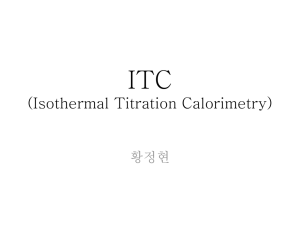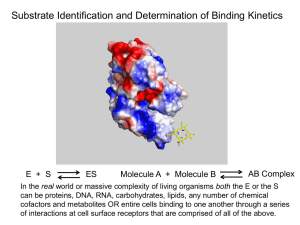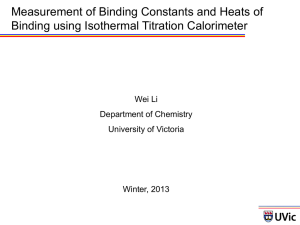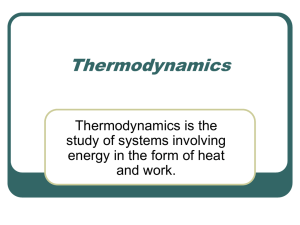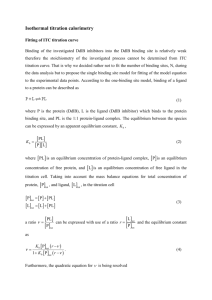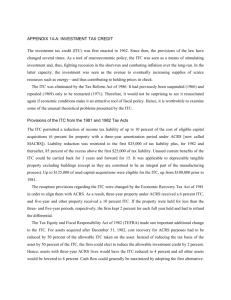ITC (Isothermal Titration Calorimetry)
advertisement
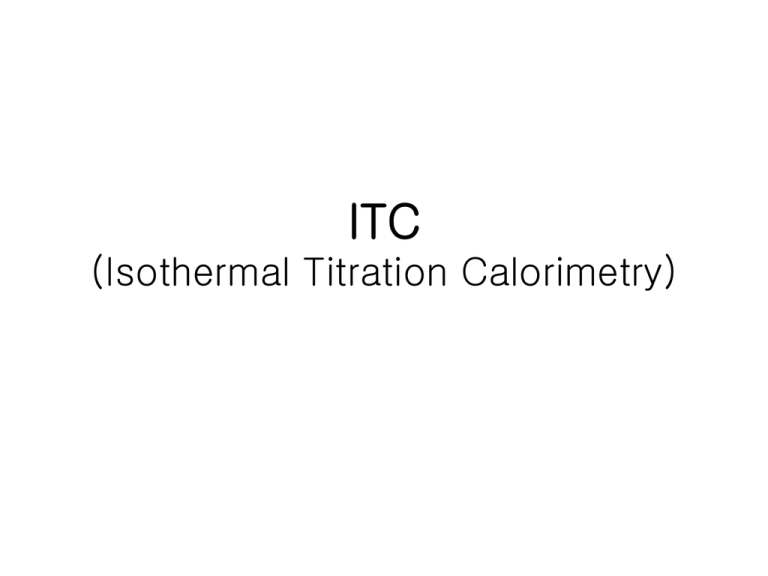
ITC (Isothermal Titration Calorimetry) Contents • • • • • • Introduction ITC technology Principle Application Data analysis Summary Introduction • • • • • Isothermal Titration Calorimetry Iso- : 같은, 동(同)-, 등(等)Thermal : ‘열’의 Titration : 적정 Calorimetry : 열량 측정 – calorimeter 열량계 Introduction Thermodynamics! • The island of incomprehensibility! Covered by a jungle of strange terminology wherein the biologist hacked through the underbrush of lush formulas for the prelims, just to paddle across the ocean of amnesia as quickly as possible (never to return). Introduction Term. • Stoichiometry of the interaction (n) • Association constant (Ka) / Dissociation constant (Kd) • Free energy (ΔGb) • Enthalpy (ΔHb) • Entropy (ΔSb) • Heat capacity of binding (ΔCp) ITC technology • Calometer를 이용한 the heat of a reaction을 측정법 • 현재, engineering과 computer 기술이 적 용. 자동화된 software를 사용 • DSC (differential scanning calorimeter) • ITC (isothermal titration calorimeter) ITC technology DSC (Differential Scanning Calorimeter) • Ideal for stability and folding studies • • • • 측정 Tm (Transition midpoint) Enthalpy (ΔH) Heat capacity (ΔCp) ITC technology ITC (Isothermal Titration Calorimeter) • Biomolecular interactions에 관한 연구 – (protein-ligand ; protein-DNA, antibodyantigen, hormone-receptor) • 모든 binding parameter를 측정 • Binding이 나타날 때 – Heat is taken up (absorbed, endothermic) – Heat is evolved (released, exothermic) Principle • Biological macromolecules의 interaction • Molecular recognition의 complexity and diversity • Immune response, signal transduction cascades, gene expression등 중요 요인 에 대한 관심과 적용 Principle Thermodynamics 연관 변수 측정하여 대상 의 정체를 밝히고자 한다. • Stoichiometry of the interaction (n) • Association constant (Ka) / Dissociation constant (Kd) • Free energy (ΔGb) • Enthalpy (ΔHb) • Entropy (ΔSb) • Heat capacity of binding (ΔCp) Principle Basic Thermodynamics of Protein-Ligand Interactions • The First Law of Thermodynamics • ΔE=Q+W – ΔE represents the change in the energy – Q the heat absorbed by the system – W the work done on the system Principle • The Second Law of Thermodynamics Q T 0 or Qreversible d T 0 Q by defining change in "entropy" as S T S or system Ssurroundin g 0 dS 0 Principle • 대부분 protein-ligand interactions – Constant temperature and pressure에서 – only work is –PΔV S system E PV system T 0 E PV is the change in "enthalpy" S H 0 T TS H 0 Principle • With the definition of (J.Willard Gibbs) "free energy" as G H TS – ΔG<0 spontaneous change – ΔG=0 equilibrium G RT ln Kb H TS Principle ΔH의 효용성 • Direct measurement of the heat of reaction – No △PV-work is the same as △H E H PV E H Principle • Indirect measure – utilizes a simplified relationship – (the van't Hoff equation) PL G G RT ln PL 0 at steady state, at which ΔG=0 PL G RT ln PL 0 P L PL P L K eq P L Principle 1 G RT lnK eq RT ln Kd H 0 1 S 0 lnK d R R T 0 RT lnK d • This is an integrated form of the van't Hoff equation d ln K eq dT H 0 2 RT Application Application • 실험 data는 protein-ligand 연구정보를 참고하여 분석 • MEDLINE search • ITC equipment suppliers Application 생물리학 연계성 • Thermodynamic parameters를 측정 – 생체 물질의 interaction – Drug나 Enzyme에 관련해서 직접적으로 • 축적된 3-D protein structures의 이해 • 여러 가지 결합 상황을 예측, design 가능 – Weak forces로 이루어지는 protein-ligand interaction을 분석, 추정 Application Advantages / Disadvantage Immobilization or labeling 필요 없다. 다양한 적용 범위 Kd, ΔH 측정 다른 온도와 pH에서 가능 ◊ Enormous amounts of binding partner ◊ Only medium affinity ◊ 많은 membrane proteins에 제약 ◊ 비싼 가격 Summary Summary • Thermodynamic parameters – Characterization and understanding of chemical reaction • Protein-ligand 영역으로의 확장 – Drug-discovery등의 다양한 영역에 실용적 • 이전 van't Hoff technique에서 발전 – Modern, automated, high-sensitivity calorimetry equipment • Proteinomics 관심 대상 – Biomolecules의 folding이나 ligands의 결합
